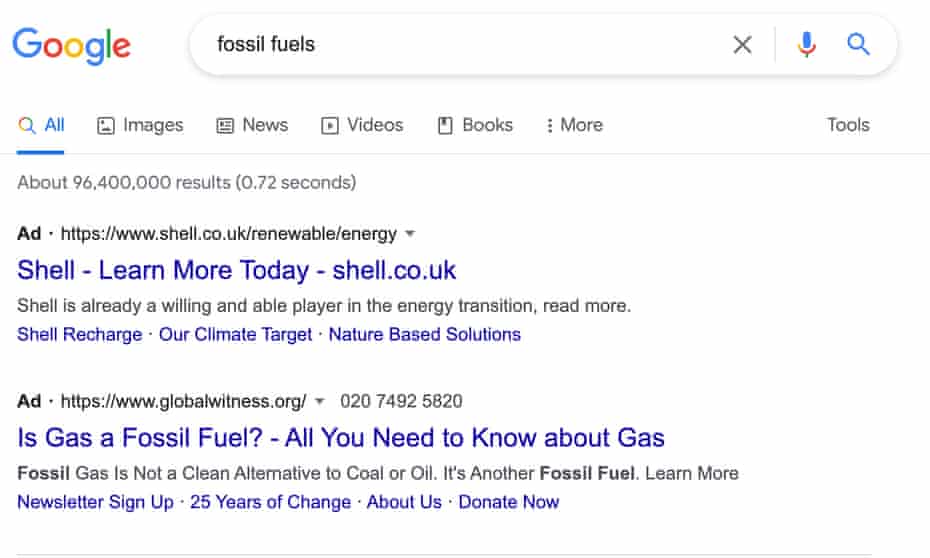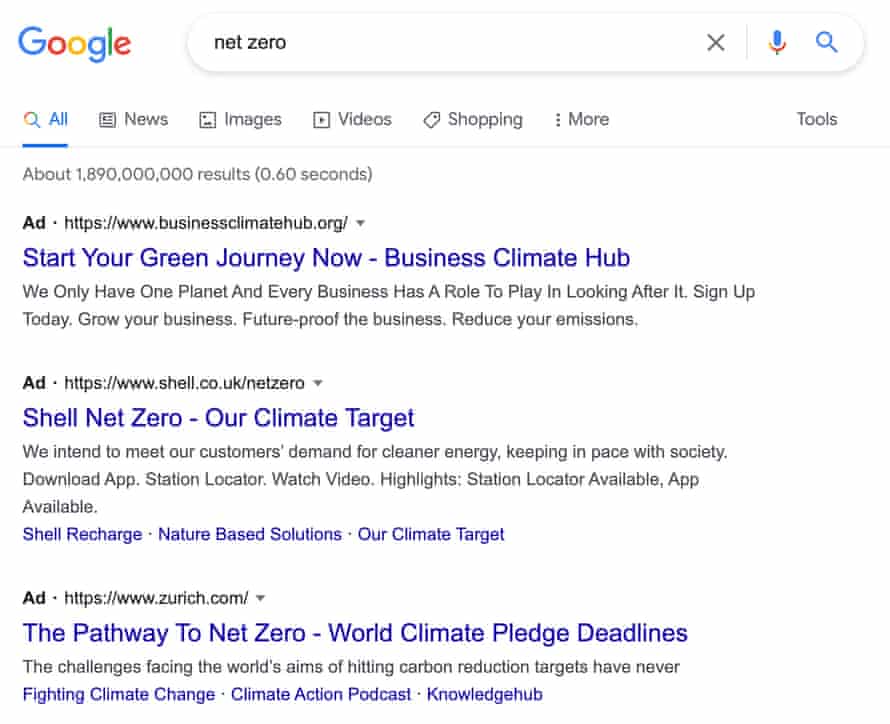One in five ads served on search results for 78 climate-related terms placed by firms with interests in fossil fuels, research finds

Google ads on the search term ‘fossil fuels’ Photograph: Google
Niamh McIntyre
@niamh_mcintyre
Wed 5 Jan 2022
Fossil fuel companies and firms that work closely with them are among the biggest spenders on ads designed to look like Google search results, in what campaigners say is an example of “endemic greenwashing”.
The Guardian analysed ads served on Google search results for 78 climate-related terms, in collaboration with InfluenceMap, a thinktank that tracks the lobbying efforts of polluting industries.
The results show that over one in five ads seen in the study – more than 1,600 in total – were placed by companies with significant interests in fossil fuels.
Advertisers pay for their ads to appear on the search engine when a user queries certain terms. The ads are appealing to businesses because they are very similar in appearance to search results: more than half of users in a 2020 survey reported they could not tell the difference between a paid-for listing and a normal Google result.
ExxonMobil, Shell, Aramco, McKinsey, and Goldman Sachs were among the top-20 advertisers on the search terms, while a number of other fossil fuel producers and their financiers also placed ads.
Jake Carbone, senior data analyst at InfluenceMap, said: “Google is letting groups with a vested interest in the continued use of fossil fuels pay to influence the resources people receive when they are trying to educate themselves.
“The oil and gas sector has moved away from contesting the science of climate change and now instead seeks to influence public discussions about decarbonisation in its favour.”
Oil major Shell’s ads – 153 were counted in total – appeared on 86% of searches for “net zero”. Many promoted its pledge to become a net zero company by 2050 and align itself with a 1.5C warming target.

Niamh McIntyre
@niamh_mcintyre
Wed 5 Jan 2022
Fossil fuel companies and firms that work closely with them are among the biggest spenders on ads designed to look like Google search results, in what campaigners say is an example of “endemic greenwashing”.
The Guardian analysed ads served on Google search results for 78 climate-related terms, in collaboration with InfluenceMap, a thinktank that tracks the lobbying efforts of polluting industries.
The results show that over one in five ads seen in the study – more than 1,600 in total – were placed by companies with significant interests in fossil fuels.
Advertisers pay for their ads to appear on the search engine when a user queries certain terms. The ads are appealing to businesses because they are very similar in appearance to search results: more than half of users in a 2020 survey reported they could not tell the difference between a paid-for listing and a normal Google result.
ExxonMobil, Shell, Aramco, McKinsey, and Goldman Sachs were among the top-20 advertisers on the search terms, while a number of other fossil fuel producers and their financiers also placed ads.
Jake Carbone, senior data analyst at InfluenceMap, said: “Google is letting groups with a vested interest in the continued use of fossil fuels pay to influence the resources people receive when they are trying to educate themselves.
“The oil and gas sector has moved away from contesting the science of climate change and now instead seeks to influence public discussions about decarbonisation in its favour.”
Oil major Shell’s ads – 153 were counted in total – appeared on 86% of searches for “net zero”. Many promoted its pledge to become a net zero company by 2050 and align itself with a 1.5C warming target.

Google ads on the search term ‘net zero’. Photograph: Google
However, Shell’s net-zero strategy relies heavily on carbon capture and offsetting, according to a Carbon Brief analysis, which says: “Despite its ‘highly ambitious’ framing … Shell’s vision of a continued role for oil, gas and coal until the end of the century remains essentially the same.”
A spokesperson for Shell said: “Shell’s target is to become a net zero emissions energy business by 2050, in step with society. Our short, medium and long-term intensity and absolute targets are consistent with the more ambitious 1.5C goal of the Paris agreement.”
Goldman Sachs, which facilitated nearly $19bn of lending to the fossil fuel industry in 2020, had the third highest number of ads. The bank’s ads appeared on almost six in 10 searches for “renewable energy”, with many emphasising its “continued commitment to sustainable finance”.
Consulting firm McKinsey’s ads appeared on more than eight in 10 searches for “energy transition” and four in 10 searches for “climate hazards”. Its ads stated: “McKinsey works with clients on innovation & growth that advances sustainability.”
Alongside its work on sustainable investing, the company receives significant income from fossil fuel clients. In recent years McKinsey has advised 43 out of the world’s 100 most polluting companies, according to the New York Times.
A spokesperson for McKinsey pointed to an op-ed written by a managing partner at the company, which states: “There is no way to deliver emissions reductions without working with these industries to rapidly transition.”
Aramco, the state-owned Saudi oil company, which is the world’s largest oil exporter, had 114 ads on the keywords “carbon storage”, “carbon capture” and “energy transition”. A number of their ads claimed the company “promoted biodiversity” and “protected the planet”.
However, Shell’s net-zero strategy relies heavily on carbon capture and offsetting, according to a Carbon Brief analysis, which says: “Despite its ‘highly ambitious’ framing … Shell’s vision of a continued role for oil, gas and coal until the end of the century remains essentially the same.”
A spokesperson for Shell said: “Shell’s target is to become a net zero emissions energy business by 2050, in step with society. Our short, medium and long-term intensity and absolute targets are consistent with the more ambitious 1.5C goal of the Paris agreement.”
Goldman Sachs, which facilitated nearly $19bn of lending to the fossil fuel industry in 2020, had the third highest number of ads. The bank’s ads appeared on almost six in 10 searches for “renewable energy”, with many emphasising its “continued commitment to sustainable finance”.
Consulting firm McKinsey’s ads appeared on more than eight in 10 searches for “energy transition” and four in 10 searches for “climate hazards”. Its ads stated: “McKinsey works with clients on innovation & growth that advances sustainability.”
Alongside its work on sustainable investing, the company receives significant income from fossil fuel clients. In recent years McKinsey has advised 43 out of the world’s 100 most polluting companies, according to the New York Times.
A spokesperson for McKinsey pointed to an op-ed written by a managing partner at the company, which states: “There is no way to deliver emissions reductions without working with these industries to rapidly transition.”
Aramco, the state-owned Saudi oil company, which is the world’s largest oil exporter, had 114 ads on the keywords “carbon storage”, “carbon capture” and “energy transition”. A number of their ads claimed the company “promoted biodiversity” and “protected the planet”.
No comments:
Post a Comment